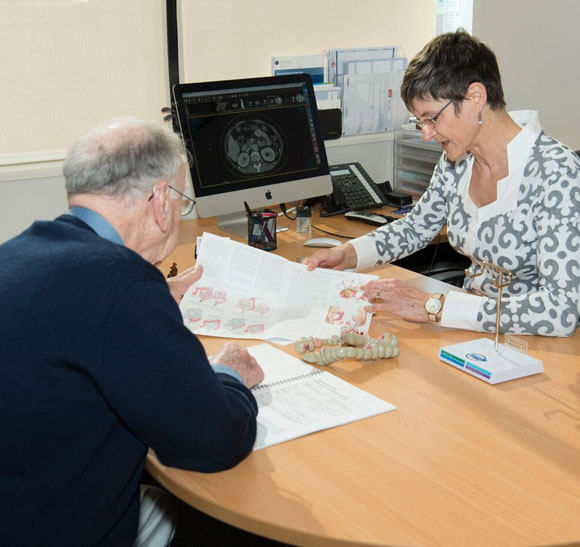What is anal cancer?
The anus is the last 3–4 cm of the digestive tract. It is the opening at the end of the rectum, where stool leaves the body. The anus is part intestine and part skin.
If the normal cells lining the anus change and grow, they can become an anal cancer.
Cancers of the anal region are uncommon. When found early, anal cancer is highly treatable.
What are the symptoms of anal cancer?
Not everyone with anal cancer will have symptoms. When symptoms do occur, they include:
- bleeding from the anus
- itchiness of the anus
- pain or pressure around the anus
- a growth/lump in the anus
- a change in bowel habits
None of these symptoms are specific for anal cancer. They also occur with other anal conditions. Many people put their symptoms down to haemorrhoids and don’t seek treatment. This can delay the diagnosis of anal cancer. It’s important to tell your doctor if you have any anal symptoms.

What causes anal cancer?
Anal cancer occurs when normal healthy cells of the anus mutate and grow out of control.
Several things can cause cell mutation. These are considered risk factors for developing anal cancer. They include:
- older age – most people with anal cancer are older than 50 years
- being infected with human papilloma virus (HPV)
- having a suppressed immune system (e.g. immunosuppressive drugs and conditions such as HIV)
- anal trauma (including from having receptive anal sex)
- anal fistula
- Crohn’s disease
- smoking.
How is anal cancer diagnosed?
Your doctor will start with an examination of your anal canal. This includes a digital rectal examination. This is where your doctor places a gloved, lubricated finger inside your anus and feels for anything unusual.
Your doctor may also:
- visually inspect your anal canal with a short, lighted tube (anoscope)
- perform an anal ultrasound – where a thin ultrasound probe is inserted into the anus and ultrasound waves create a picture of your anal canal
- take a sample of tissue (biopsy) for testing by a pathologist.
If anal cancer is confirmed, your anal cancer specialist will determine the size of the cancer and whether it has spread. This process is called staging. It may include scanning with CT, MRI or positron emission tomography (PET).
Your anal cancer specialist will use the information from the scans to assign a stage to your cancer. The stages of anal cancer are:
- stage I – the anal cancer is 2 cm or less
- stage II – the anal cancer is larger than 2 cm but has not spread outside the anal canal
- stage IIIA – the anal cancer is any size and has spread to nearby lymph nodes or areas (e.g. bladder, urethra, vagina)
- stage IIIB – anal cancer is any size and has spread to nearby areas and lymph nodes, or it has spread to other lymph nodes in the pelvis
- stage IV – anal cancer has spread to parts of the body away from the pelvis.
About half of the people with anal cancer are diagnosed before the cancer has spread. The earlier it is detected, the more successful the treatment.
How is anal cancer treated?
The rate of cure for anal cancer is high (75–90%).
The treatment you receive for anal cancer depends on the stage of your cancer, your general health and your own preferences.
Most people with anal cancer are treated with a combination of:
- chemotherapy – which involves medicines that kill cancer cells or stop them growing
- radiation – which kills cancer cells
Typically, radiation therapy for anal cancer takes 5–6 weeks. Chemotherapy is usually given during the first week and the fifth week. Your treatment will be tailored to your specific cancer and your health.
Some types of anal cancer do not respond to chemotherapy and radiation. In these cases surgery is needed to remove the cancer.
